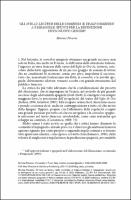Chapter Gli Avis au lecteur delle comédies (e tragi-comédies) à l’espagnole: spunti per la definizione di un nuovo genere?
| dc.contributor.author | PAVESIO, Monica | |
| dc.date.accessioned | 2022-06-01T12:17:35Z | |
| dc.date.available | 2022-06-01T12:17:35Z | |
| dc.date.issued | 2020 | |
| dc.identifier | ONIX_20220601_9788855181501_443 | |
| dc.identifier.issn | 2704-5919 | |
| dc.identifier.uri | https://library.oapen.org/handle/20.500.12657/56260 | |
| dc.description.abstract | It is well known that in France the Spanish comedy is not considered a model to be imitated, yet, reading the peritexts (dédicace, avis au lecteur, épître) of the 17th Century French adapters and comparing the imitations with the sources, we can see attitudes that are not always connected to preconceived ideas about the superiority of génie français, both in the consideration that the playwrights reveal towards contemporary Spanish plays, and in their way of adapting them. After outlining the duration and extent of the phenomenon of the seventeenth-century comédie à l'espagnole, the study analyzes the pièces and the peritexts, following two paths: the first investigates the real knowledge and opinion that the French dramatists had of Spanish dramaturgy; the second reconstructs and analyzes the translation methods that, in their forewords, the adapters claim they want to use to make Spanish theatrical texts usable in France, and which they often disregard in their pièces. | |
| dc.language | Italian | |
| dc.relation.ispartofseries | Studi e saggi | |
| dc.subject.other | comédie à l'espagnole | |
| dc.subject.other | paratexts | |
| dc.subject.other | translation methods | |
| dc.title | Chapter Gli Avis au lecteur delle comédies (e tragi-comédies) à l’espagnole: spunti per la definizione di un nuovo genere? | |
| dc.type | chapter | |
| oapen.identifier.doi | 10.36253/978-88-5518-150-1.5 | |
| oapen.relation.isPublishedBy | bf65d21a-78e5-4ba2-983a-dbfa90962870 | |
| oapen.relation.isbn | 9788855181501 | |
| oapen.series.number | 209 | |
| oapen.pages | 18 | |
| oapen.place.publication | Florence |

